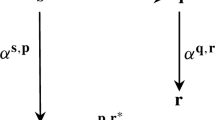Abstract
This paper starts by indicating the analysis of Hempel’s conditions of adequacy for any relation of confirmation (Hempel, 1945) as presented in Huber (submitted). There I argue contra Carnap (1962, Section 87) that Hempel felt the need for two concepts of confirmation: one aiming at plausible theories and another aiming at informative theories. However, he also realized that these two concepts are conflicting, and he gave up the concept of confirmation aiming at informative theories. The main part of the paper consists in working out the claim that one can have Hempel’s cake and eat it too — in the sense that there is a logic of theory assessment that takes into account both of the two conflicting aspects of plausibility and informativeness. According to the semantics of this logic, α is an acceptable theory for evidence β if and only if α is both sufficiently plausible given β and sufficiently informative about β. This is spelt out in terms of ranking functions (Spohn, 1988) and shown to represent the syntactically specified notion of an assessment relation. The paper then compares these acceptability relations to explanatory and confirmatory consequence relations (Flach, 2000) as well as to nonmonotonic consequence relations (Kraus et al., 1990). It concludes by relating the plausibility-informativeness approach to Carnap’s positive relevance account, thereby shedding new light on Carnap’s analysis as well as solving another problem of confirmation theory.
Similar content being viewed by others
References
Carnap, R.: 1962, Logical Foundations of Probability, 2nd ed., University of Chicago Press, Chicago.
Christensen, D.: 1999, Measuring confirmation, Journal of Philosophy 96, 437–461.
Fitelson, B.: 1999, The plurality of Bayesian measures of confirmation and the problem of measure sensitivity, Philosophy of Science 66, S362–S378 (Proceedings).
Flach, P.A.: 2000, Logical characterisations of inductive learning, in D. M. Gabbay and R. Kruse (eds.), Abductive Reasoning and Learning, Kluwer, Dordrecht, pp. 155–196.
Gabbay, D.M.: 1985, Theoretical foundations for non-monotonic reasoning in expert systems, in K. R. Apt (ed.), Logics and Models of Concurrent Systems, NATO ASI Series 13, Springer, Berlin Heidelberg New York, pp. 439–457.
Hempel, C.G.: 1945, Studies in the logic of confirmation, Mind 54, 1–26, 97–121.
Huber, F.: 2006, Ranking functions and rankings on languages, Artificial Intelligence 170, 462–471.
Huber, F.: 2005, What is the point of confirmation? Philosophy of Science 72, 1146–1159.
Huber, F.: (to appear), Assessing Theories, Bayes Style, Synthese.
Huber, F.: (submitted), Hempel’s Logic of Confirmation.
Joyce, J.M. 1999, The Foundations of Causal Decision Theory, Cambridge University Press, Cambridge.
Kraus, S., Lehmann, D. and Magidor, M.: 1990, Nonmonotonic reasoning, preferential models, and cumulative logics, Artificial Intelligence 40, 167–207.
Makinson, D.: 1989, General theory of cumulative inference, in M. Reinfrank, J. de Kleer, M. L. Ginsberg, and E. Sandewall (eds.), Non-Monotonic Reasoning, Lecture Notes in Artificial Intelligence 346, Springer, Berlin Heidelberg New York, pp. 1–18.
Milne, P.: 2000, Is there a logic of confirmation transfer? Erkenntnis 53, 309–335.
Spohn, W.: 1988, Ordinal conditional functions: a dynamic theory of epistemic states, in W. L. Harper and B. Skyrms (eds.), Causation in Decision, Belief Change, and Statistics II, Kluwer, Dordrecht, pp. 105–134.
Zwirn, D. and Zwirn, H.P.: 1996, Metaconfirmation, Theory and Decision 41, 195–228.
Author information
Authors and Affiliations
Corresponding author
Additional information
A precursor of this paper has appeared as “The Logic of Confirmation and Theory Assessment” in L. Běhounek & M. Bílková (eds.), The Logica Yearbook 2004, Prague: Filosofia, 2005, 161–176.
Rights and permissions
About this article
Cite this article
Huber, F. The Logic of Theory Assessment. J Philos Logic 36, 511–538 (2007). https://doi.org/10.1007/s10992-006-9044-9
Received:
Published:
Issue Date:
DOI: https://doi.org/10.1007/s10992-006-9044-9



